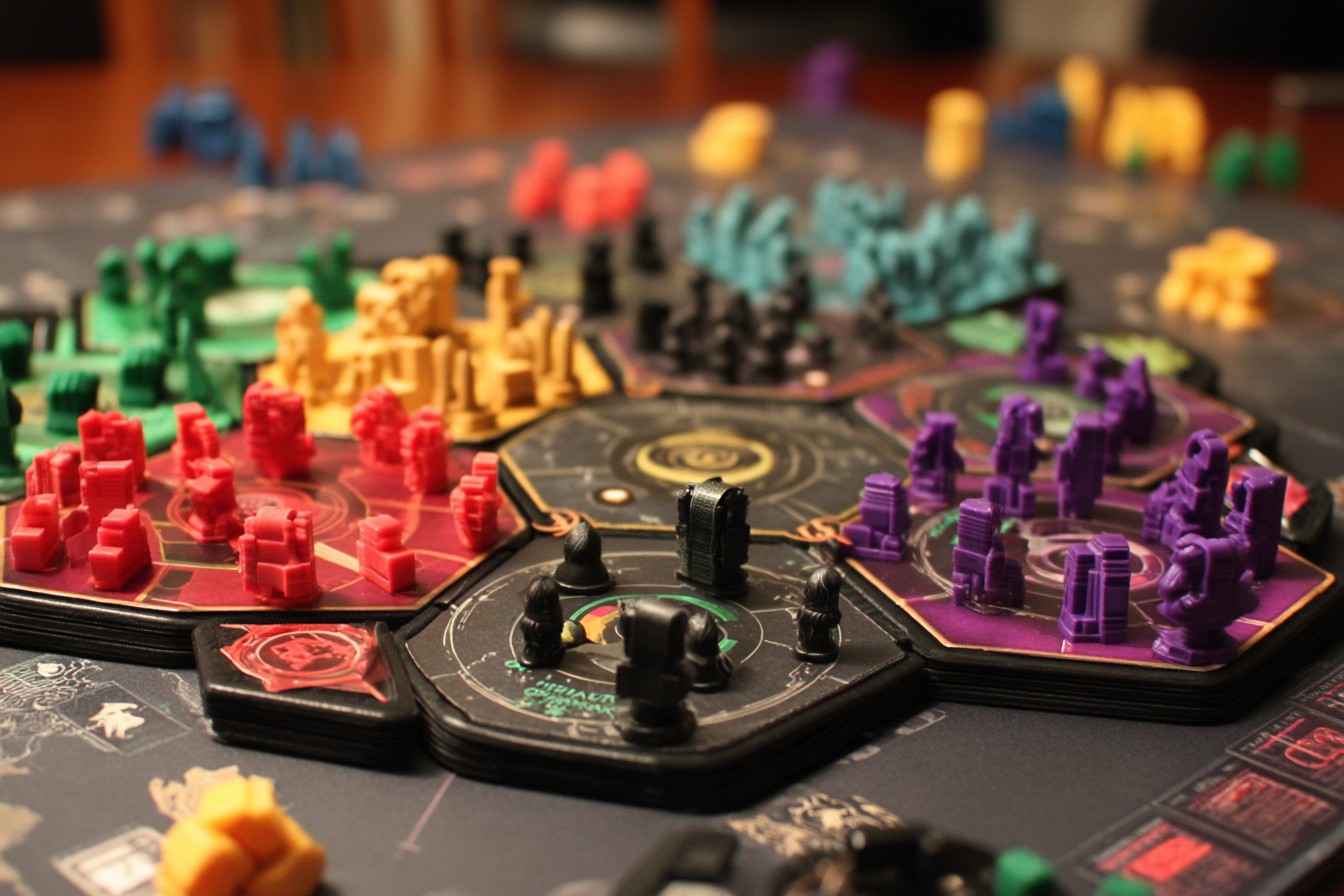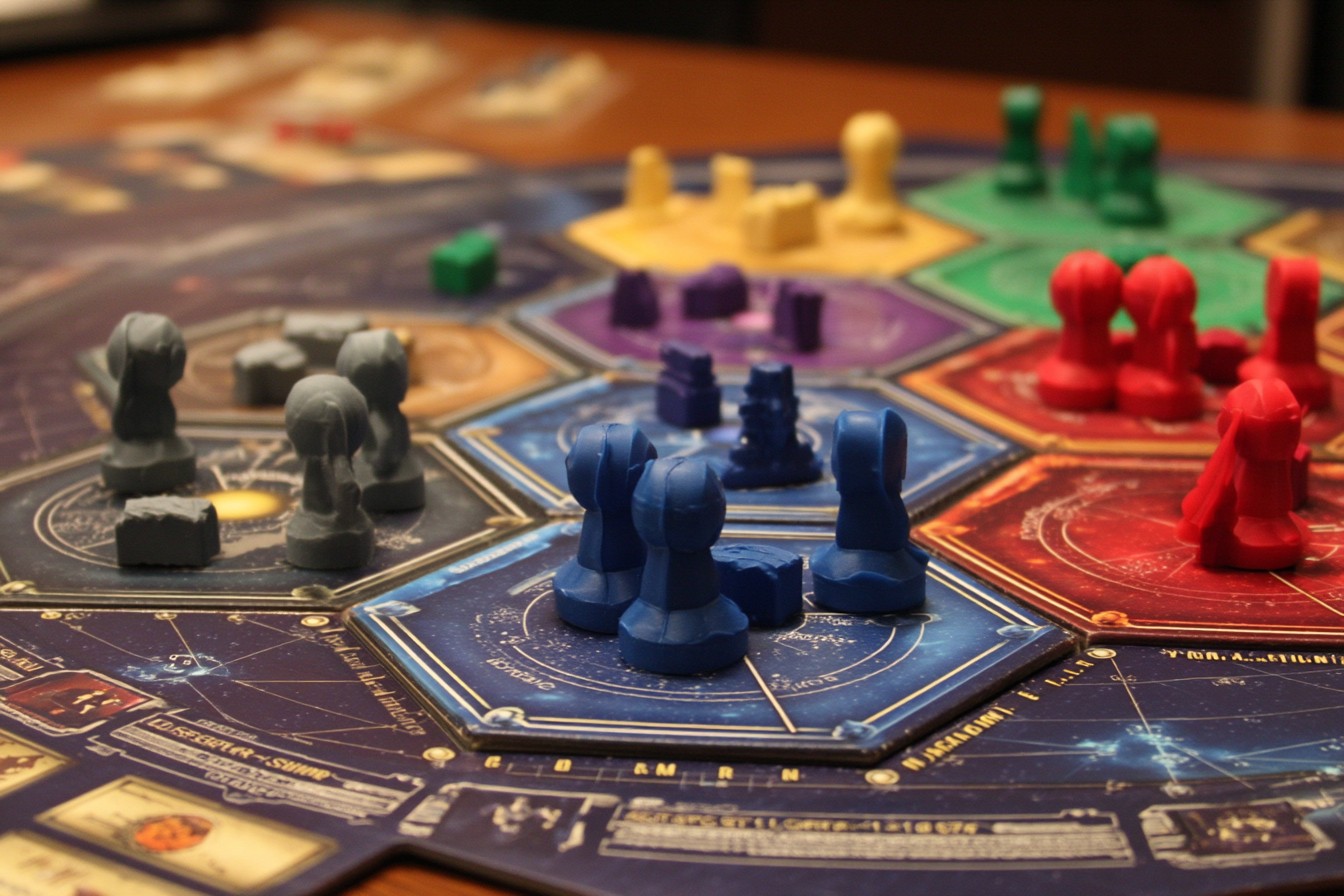I still remember my first Politics phase in Twilight Imperium like it was yesterday, even though it was actually somewhere around 2008 in Jeff’s basement. I’d selected the Politics strategy card, feeling incredibly powerful as I shuffled through the agenda deck, searching for something that would benefit my Emirates of Hacan. After careful consideration, I proposed what I thought was a perfectly reasonable law that would slightly boost trade—clearly benefiting everyone, but my merchant faction most of all.
What followed was twelve minutes of the most brutal negotiation I’d ever experienced in a board game. My “reasonable” proposal was systematically dismantled by five other players who suddenly seemed convinced I was about to win the game if this passed. The agenda failed with one vote in favor (mine) and everyone else against. My political career was over before it began.
After 60+ games of this magnificent space opera spanning nearly fifteen years, I’ve learned that the Politics phase isn’t about the agendas you want to pass—it’s about understanding exactly what everyone else at the table wants and fears, then leveraging that knowledge to advance your position. The actual content of the agenda cards is almost secondary to the psychological game being played above the table.
I think of Politics in Twilight Imperium as having three distinct layers: the formal rules layer (what the cards say), the negotiation layer (what deals you make), and the meta layer (what this reveals about everyone’s strategic position). Most players focus entirely on the first two, but it’s mastery of that third layer that actually gets your agendas passed.
Let’s start with a concrete framework I’ve developed for evaluating the table before I even look at the agenda cards. For each player, I mentally assign values to four key factors:
1. Their current victory point count and trajectory
2. Their board position (territory control and fleet strength)
3. Their racial abilities and how they interact with potential agendas
4. Their personality as a player (aggressive, passive, vindictive, etc.)
That last one might seem out of place, but in a game like TI, the human element is as important as the game mechanics. My friend Tom will never support an agenda that helps the player who last attacked him, even if it would benefit him too. Understanding that vindictive streak is crucial information.
Once I have that assessment, I look for natural alliance blocks—players who share interests due to game position or victory point pacing. The key insight here is that these alliances need not be explicit or even acknowledged by the players themselves. Two players who are both three turns away from a potential victory are natural allies against anyone who might score sooner.
With this map of the table in mind, I’ll finally look at the agendas themselves. But rather than asking “what’s best for me?” I’m asking “what agenda creates the most useful voting blocs for my position?” Sometimes an agenda that is only modestly beneficial to you personally but creates strong alliance structures can be far more valuable than one that helps you a lot but unites everyone else against you.
This approach led to what my group still calls “The Great Trade Federation Coup” in a game back in 2014. I was playing as the Federation of Sol (humans), lagging slightly at 6 victory points while the Xxcha Kingdom was sitting at 8. The first agenda I revealed was a law that would give a victory point to whoever controlled Mecatol Rex (the center planet) at game end. I didn’t control Mecatol and had no realistic path to taking it—but neither did the Xxcha. Instead of voting based on my own benefit (which would be to oppose it), I orchestrated a voting bloc of everyone against the one player who might conceivably take Mecatol, effectively removing them as a threat to me. The agenda passed, and the resulting diplomatic chaos as that player sought revenge against others gave me the breathing room to score my final points.
Linda (my ever-strategic wife) has mastered what she calls the “implied threat” approach to politics. Rather than explicitly stating what she’ll do if an agenda fails, she’ll casually mention how close her fleet is to someone’s home system or how many action cards she’s holding. The beauty of this technique is that it creates pressure without forcing anyone to call your bluff. I’ve seen players change their votes based entirely on Linda saying, “Hmm, interesting that your home system only has two PDS units defending it” before a crucial vote.
There’s also immense power in being the agenda setter—which seems obvious, but most players squander it by focusing too much on what they want rather than what’s possible. I’ve taken to maintaining a mental “wish list” for each player at the table, noting what specific benefits they seem to be pursuing. Then, when I have the Politics card, I’ll sometimes deliberately select an agenda that fulfills someone else’s wish rather than my own, but only if I can extract a valuable concession in return.
“I’ll give you what you want, but I need your support on the next agenda sight unseen” is an incredibly powerful negotiation position. The fascinating psychology here is that players value getting something they specifically want far more than preventing you from getting something equivalent. By giving them their wish while securing their support for yours, you often end up with a net advantage.
The cardinal rule of political success in Twilight Imperium is something I call the “natural majority principle”: never try to pass an agenda that doesn’t already have natural support from at least half the table. If you’re trying to convince people to vote against their interests, you’ve already lost. Instead, find the agenda that has organic support and then shape it to your advantage through secondary deals.
Trade goods as bribes seem like an obvious strategy, but I’ve found they’re actually much more effective as enforcement mechanisms than as initial incentives. “I’ll give you two trade goods if you vote for this” is weak. “I’ll give you two trade goods now, but if you don’t vote as promised, I’ll consider it a hostile action” is powerful. The difference is subtle but important—the former is a simple transaction, while the latter establishes an ongoing relationship with consequences.
My buddy Derek, probably the best TI player in our group, uses what he calls the “balanced scales” approach. He’ll never propose an agenda that clearly benefits him without simultaneously offering side deals that create equivalent value for potential opponents. The key is that while the main benefit is visible to everyone, these side deals often happen in hushed conversations around the table. To the casual observer, it might look like Derek got the better end of the agenda, but everyone who voted for it actually received compensation in other forms.
Actions cards and promissory notes dramatically change the political calculus, especially when wielded as political tools rather than tactical ones. I once watched a player use the threat of revealing a “Veto” action card to extract favorable trade terms from three different players in the same political phase—without ever actually playing the card. The mere possibility of intervention created leverage he exploited masterfully.
The timing of when you play Politics is also crucial. Early game Politics phases tend to focus on structural laws that shape the game environment, while late game phases typically involve direct victory point manipulation or targeted attacks on the leader. Understanding this rhythm helps you select the right moment to push your agenda. I’ve deliberately taken Politics in Round 5 instead of Round 6 specifically because I knew players would be less defensive about certain types of agendas one round earlier.
Temperature in the room affects voting patterns too—I’m not joking. We’ve played TI in everything from Jeff’s freezing basement to summer games on my back deck, and I’ve noticed people make more aggressive, risk-taking votes when they’re physically uncomfortable. Hot room? Expect more vindictive voting and less rational cooperation. This sounds ridiculous, but I’ve tracked it across multiple games, and it’s a real factor.
One fascinating psychological technique I’ve employed is what I call “the reluctant beneficiary.” When I know an agenda will help me substantially, I’ll sometimes argue against my own interests initially, expressing concern about its implications. This pre-emptively defuses the natural suspicion others would have about my support. “I’m not sure if this Trade Agreement law really helps me as the Emirates of Hacan—it might actually give some of you too much ability to compete with my trade routes…” Meanwhile, I’m thinking “please pass this amazing law that will completely cement my trade dominance.”
Speaking of psychology, the physical act of how you present agendas matters too. I’ve found that revealing both agendas simultaneously rather than sequentially changes how people vote on the first one. When they can see both options, they make comparative judgments rather than evaluating each agenda on its merits. If one agenda is clearly worse for the table than the other, revealing both at once often helps the “less bad” option pass, even if it would have failed in isolation.
The meta-game of reputation builds across multiple TI sessions too. In our regular group, I’ve deliberately cultivated a reputation for political trustworthiness—I never break explicit voting promises. This doesn’t mean I don’t manipulate or deceive in other ways, but that specific bright line gives others confidence in making deals with me. Linda, meanwhile, has embraced political chaos as her brand. No one knows how she’ll vote, making her the pivotal swing voice in many crucial agendas.
After fifteen years of playing this magnificent game, I’ve come to believe that the Politics phase is where games are truly won and lost. Military engagements might be more dramatic, but a well-played Politics phase can shift the fundamental power balance of the game without a single plastic ship being moved. It’s diplomatic action in its purest form—persuasion, perception, and power all intertwined in a delicate dance.
So the next time you pick up that Politics strategy card, remember: don’t just look at the agendas. Look at the players. Understand what they want, what they fear, and what they believe about the current game state. Find the hidden alignments of interest that already exist at your table, and gently guide them toward outcomes that advance your position. Creating a law that passes isn’t about writing the perfect policy—it’s about understanding the political reality in which that policy will be evaluated.
And if all else fails, you can always resort to Linda’s approach: casually mention how many War Suns you have in production while making direct eye contact with the player who’s on the fence about your proposal. It’s amazing how persuasive that can be.





Leave a Reply